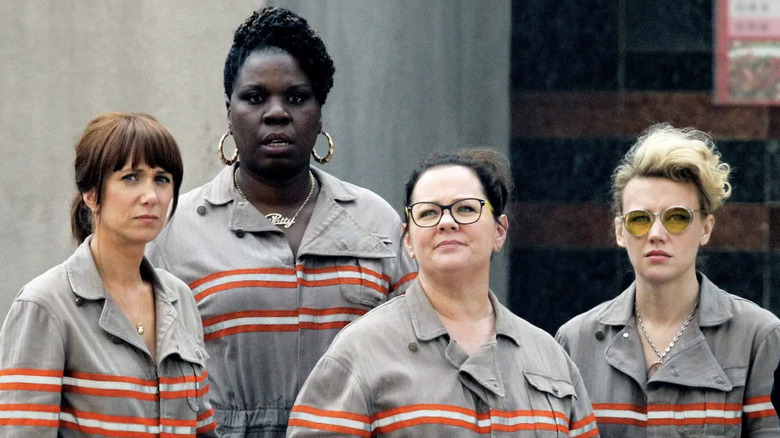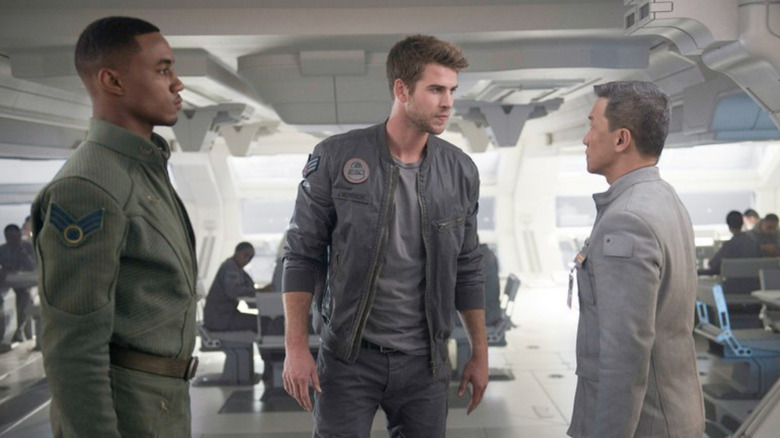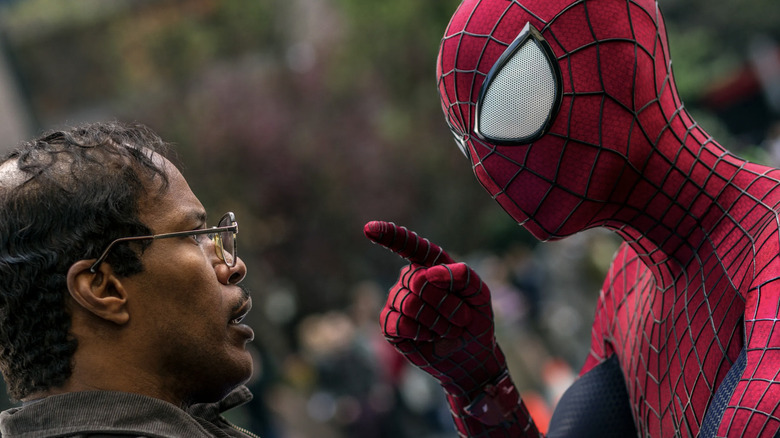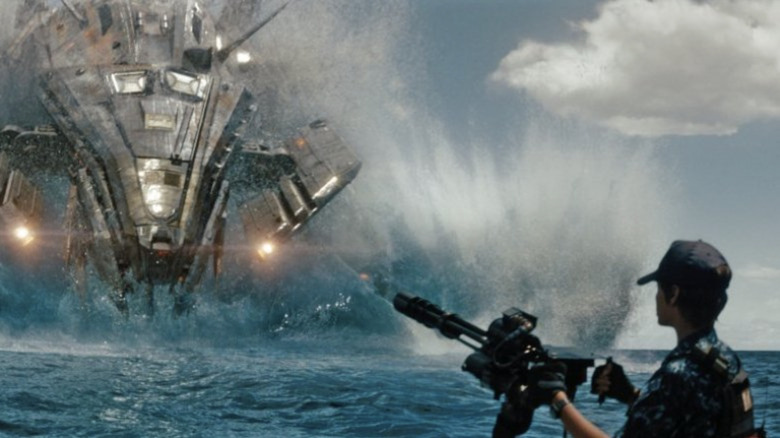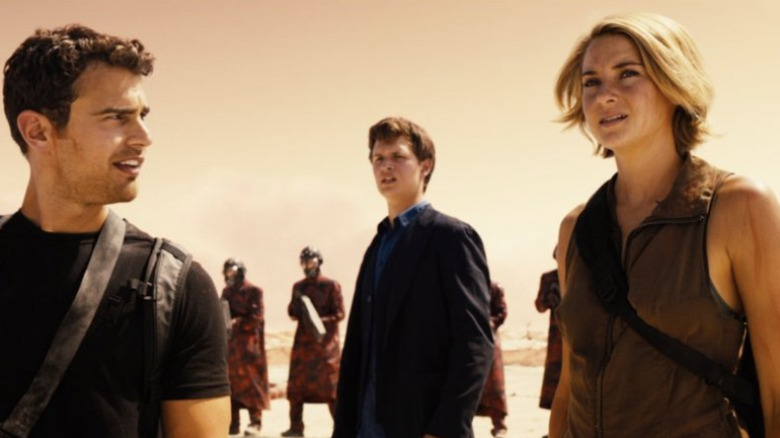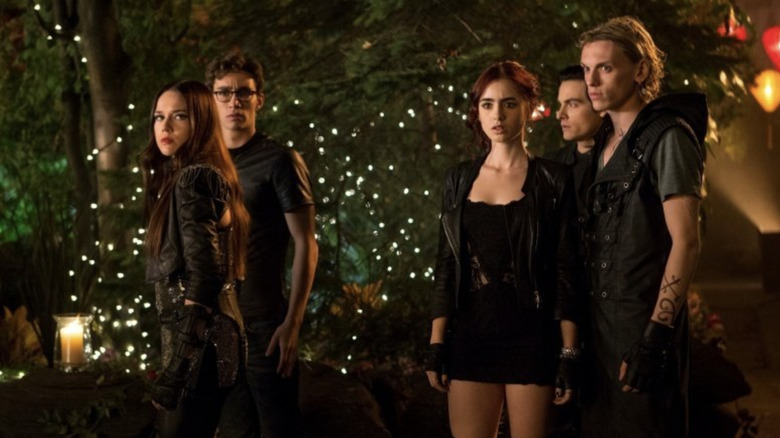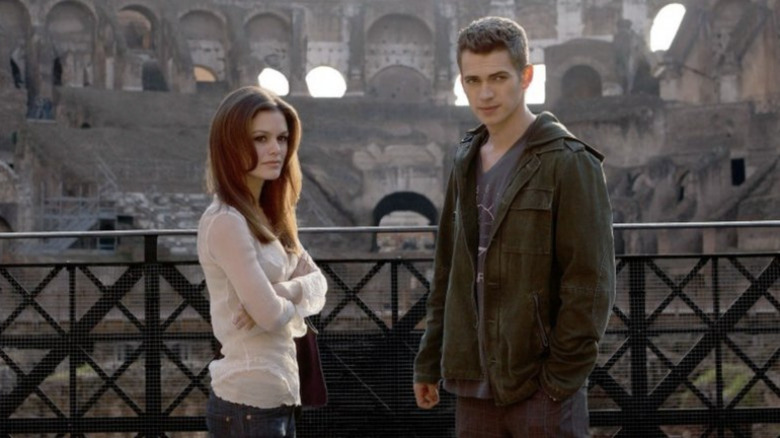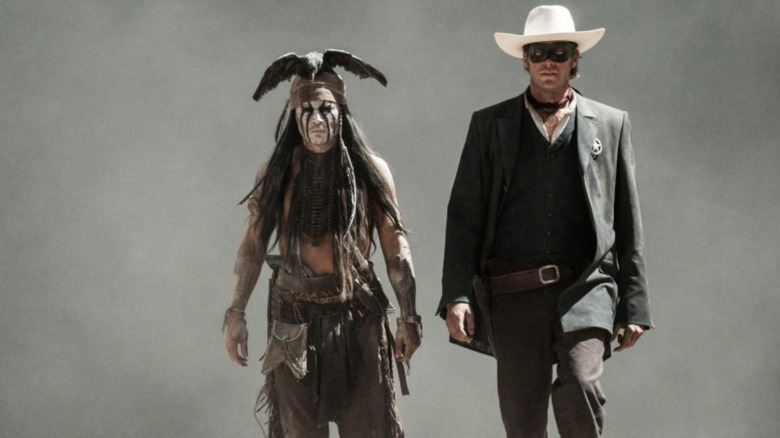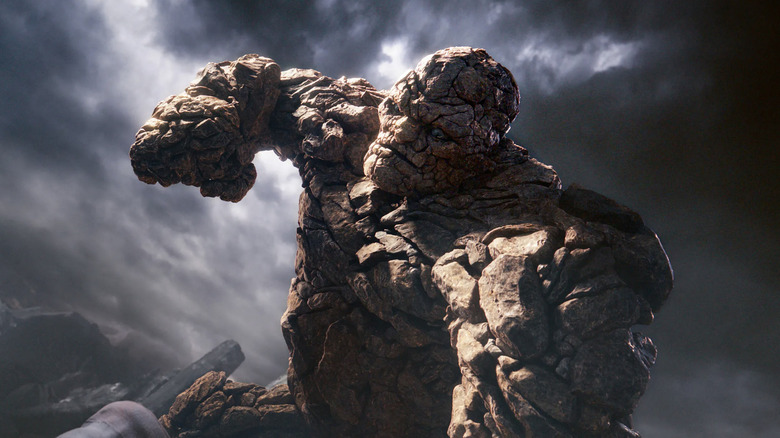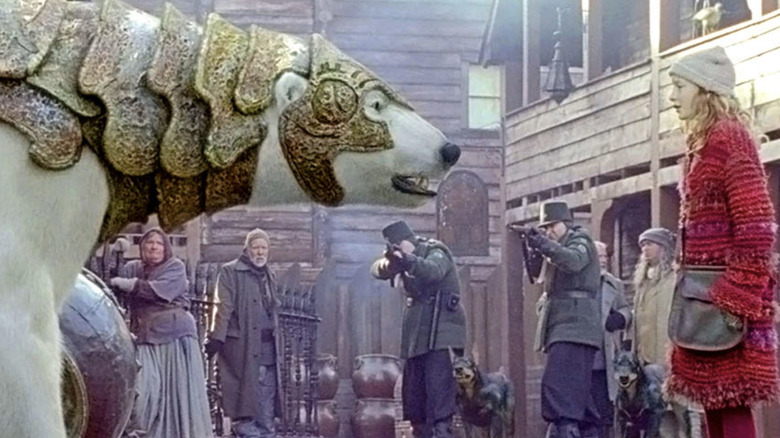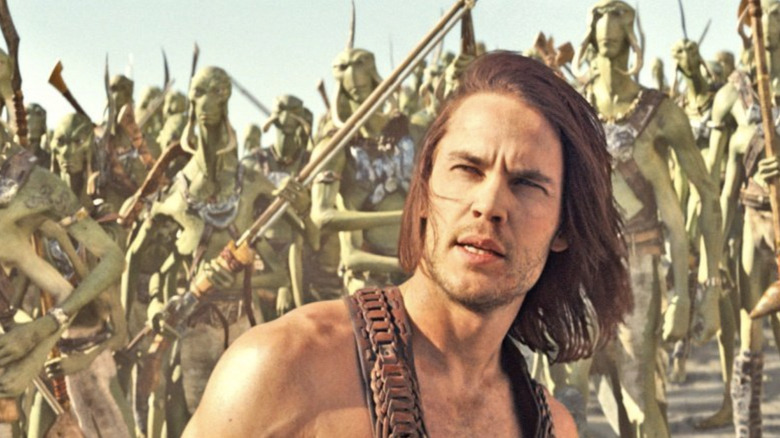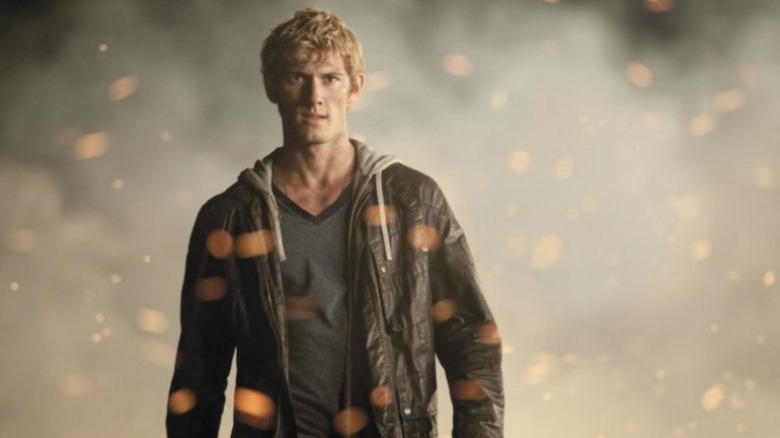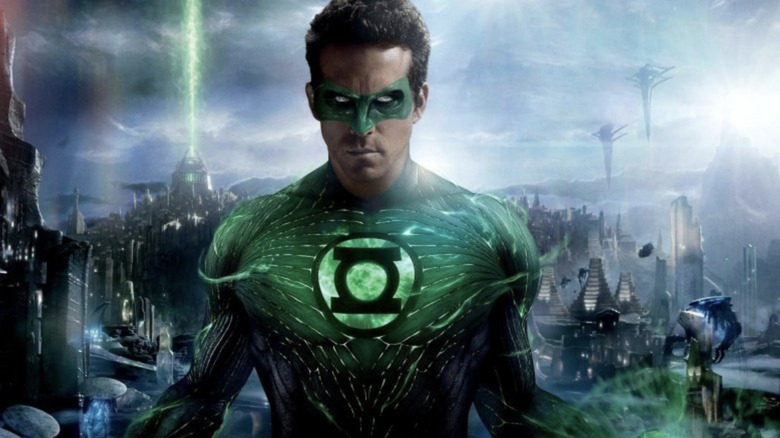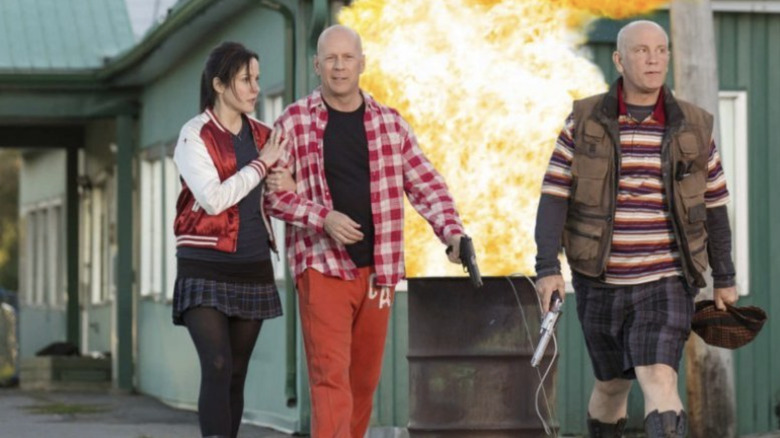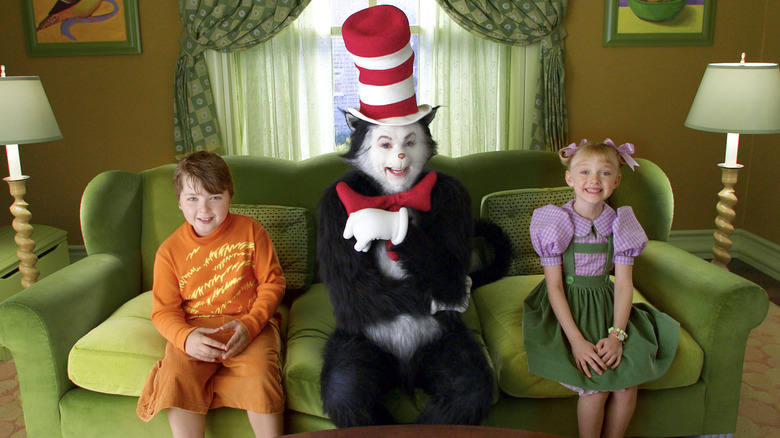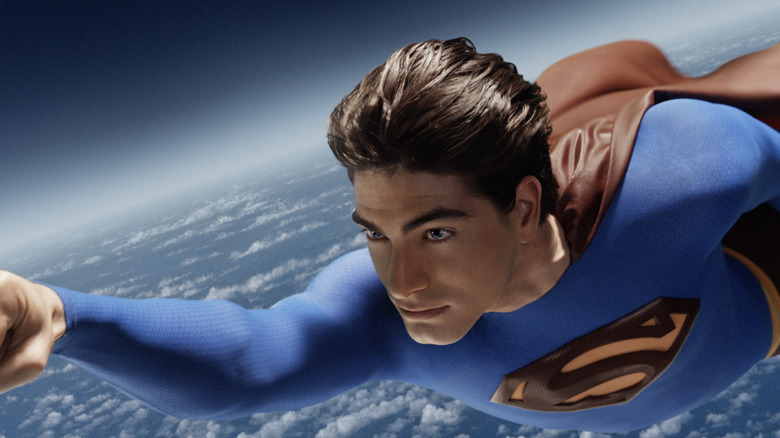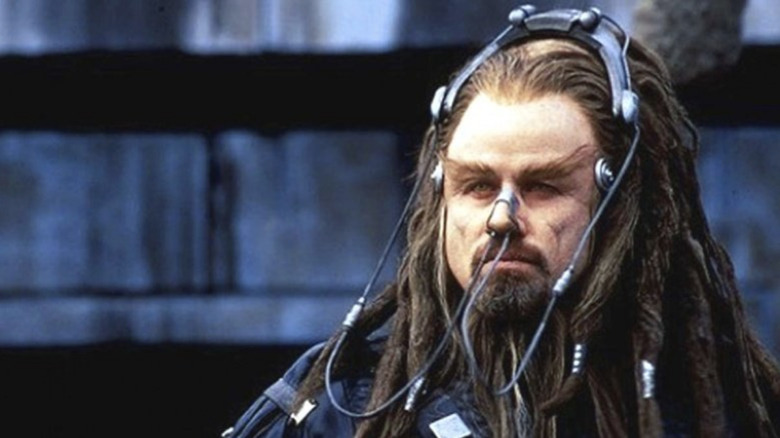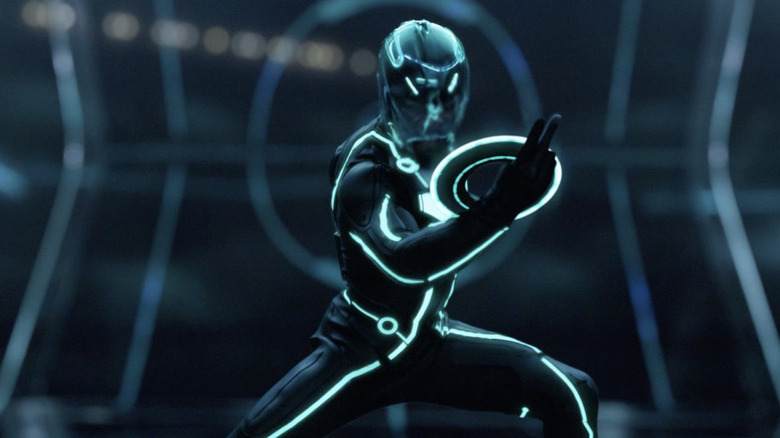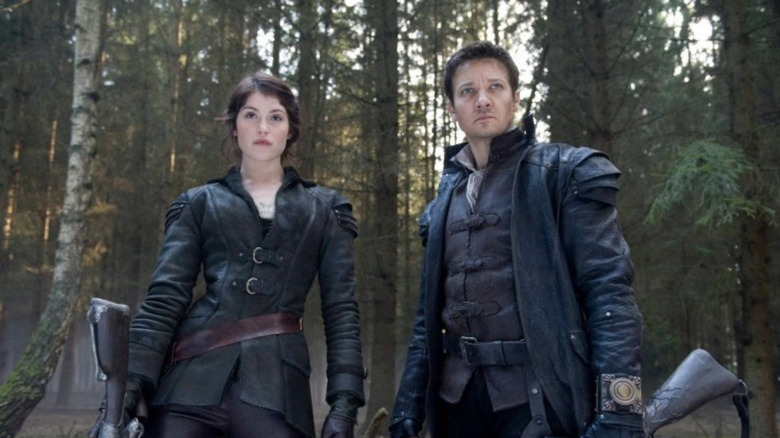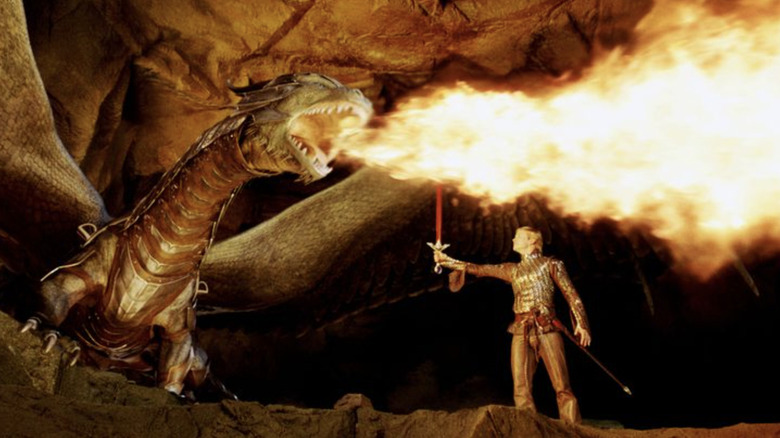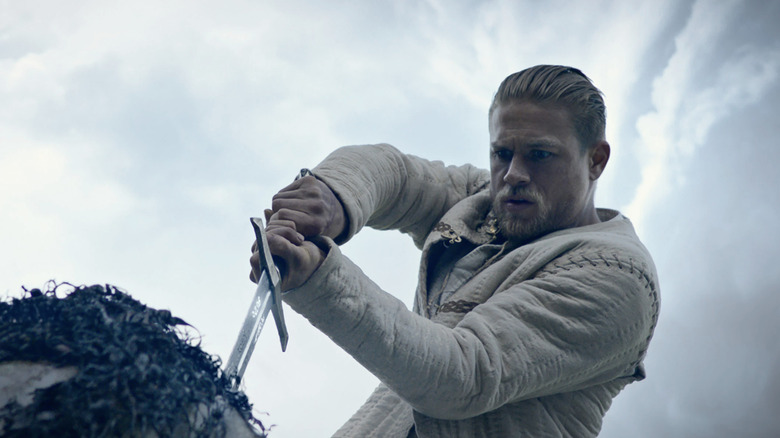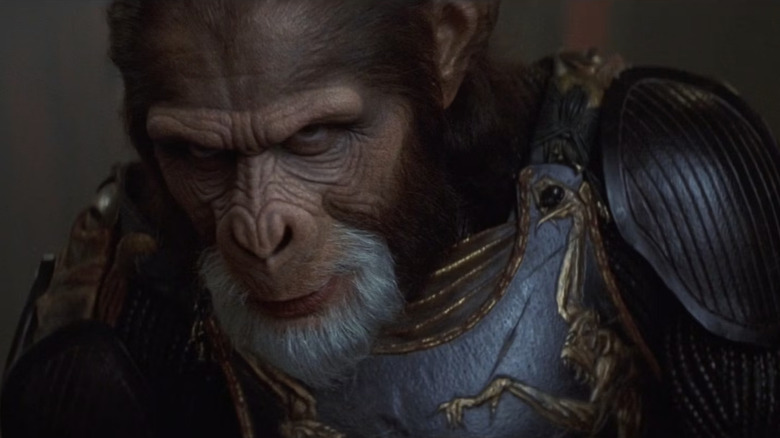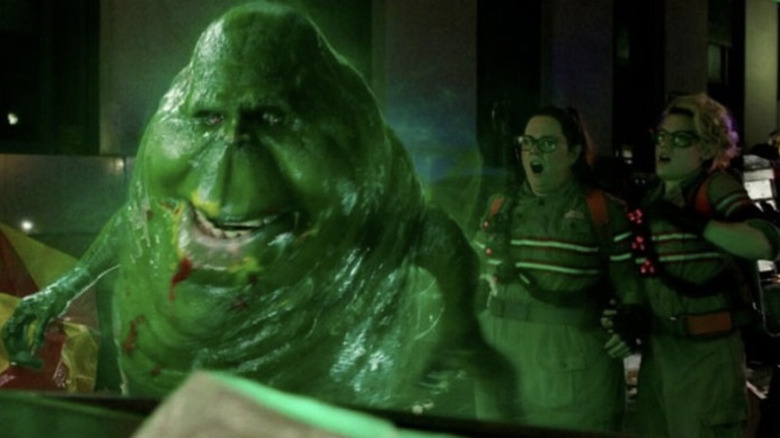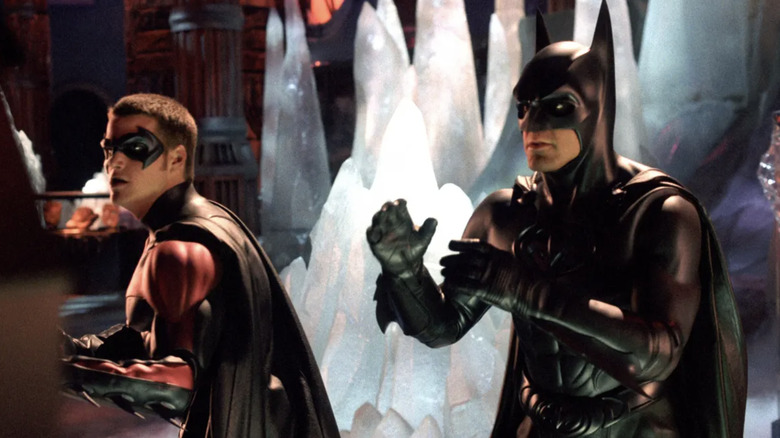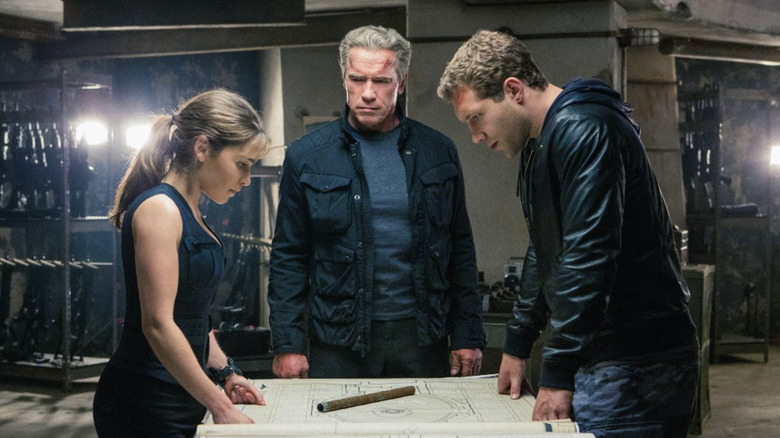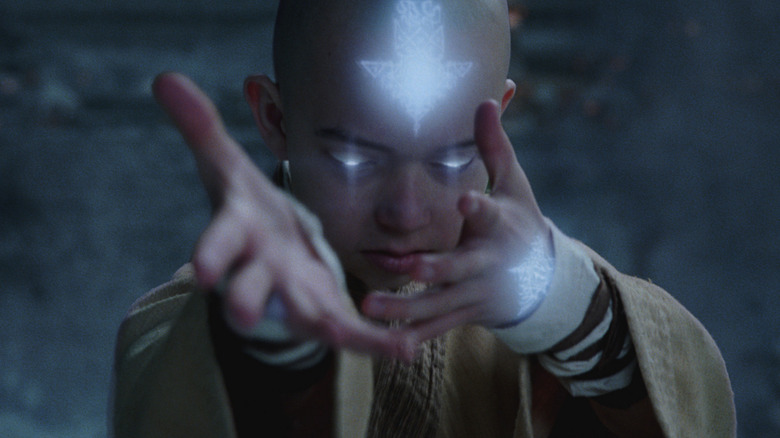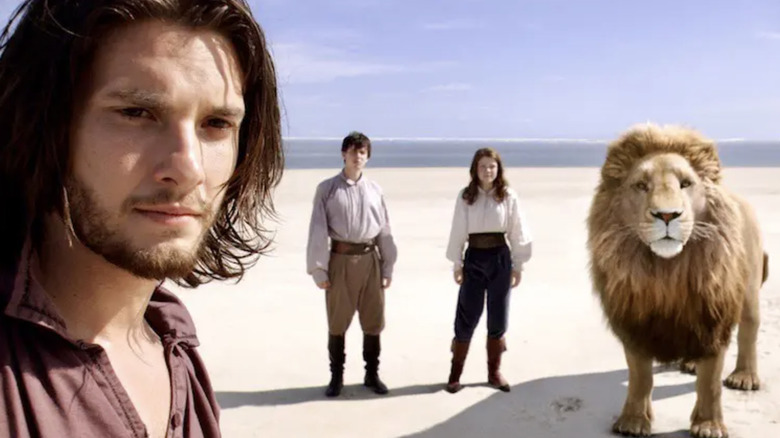Movies That Were So Bad They Had To Cancel The Sequel
No one has higher hopes than the studio when it comes to a movie's franchise potential. After putting countless hours and alarming amounts of money into production, success is inevitable, right? If the studio senses that a feature could be the start of something major, they might even greenlight a follow-up before the film even hits theaters. Sadly, not every major motion picture does well at the box office, and in some cases, entire film franchises have been canceled after poor box office returns from a single film.
In a world full of larger-than-life cinematic universes that continue to pop up around us, it's easy to think that Hollywood is just a giant success machine that keeps churning out profit-making content. However, there are plenty of big-name productions—many of which you probably know—that fail to perform to their highest potential and end up causing plenty of destruction in their wake. That's admittedly pretty dramatic, but this is the arts; everything's about the drama here.
Regardless of the big-name stars, directors, or studios attached, not every Hollywood feature is a home run. These are some of Hollywood's greatest failures in their attempts to launch a series of films, or an entire franchise, based on one motion picture.
Independence Day: Resurgence
It took 20 years for "Independence Day" to get its first legacy sequel—much longer than many of us had hoped—and when it did, well, let's just say we could've waited a little longer. "Independence Day: Resurgence" was expected to be the first of three planned follow-up films that would continue Roland Emmerich's beloved holiday-centric alien invasion story. The original movie was a box office smash and earned mostly favorable reviews; sadly, "Resurgence" was too little, too late. It didn't help that Will Smith opted not to return in favor of "Suicide Squad," but even Captain Steven Hiller couldn't have saved the day this time around.
The movie was slammed by critics for being an elaborate but ultimately empty spectacle, and while it wasn't an intergalactic bomb at the ticket booth, its lackluster receipts didn't indicate much audience interest in the movie or its potential sequels, and its franchise potential fizzled. There's still some hope for those who'd like to see the future of the series (which would see some of its heroes on a new space adventure); according to Emmerich, now that 20th Century Fox is owned by the House of Mouse, a third "ID4" installment could be possible yet again (via CinemaBlend). Still, it hardly looks like the blockbuster franchise it was poised to be.
The Amazing Spider-Man 2
Before Sony even released their second installment of "The Amazing Spider-Man" story, both the third and fourth films were announced in 2013. With creatives Alex Kurtzman, Roberto Orci, and Jeff Pinkner set to reunite with director Marc Webb—a man perfectly named to helm a "Spider-Man" franchise—to expand Peter Parker's story, they aimed to expand the greater "Amazing Spider-Man" universe as well. Soon, "Venom," "Sinister Six," and other Spidey-themed projects were thrust into development as Sony set their eyes on building a Marvel universe of their own to rival Disney's growing Marvel Cinematic Universe. After an underwhelming performance by "The Amazing Spider-Man 2," Sony made a deal with Marvel Studios, granting the studio the usage of the Spider-Man character, albeit a de-aged and rebooted version.
This new Spider-Man—now played by Tom Holland instead of Andrew Garfield—appeared first in "Captain America: Civil War" before starring in his own Marvel Studios/Sony co-production "Spider-Man: Homecoming." From there, Holland's Peter Parker starred in his own film trilogy aside from working alongside "The Avengers." Though "The Amazing Spider-Man" universe didn't happen, "Venom" was made anyhow and Garfield's Spider-Man (and his foes) returned for "Spider-Man: No Way Home," where the character's story was rounded out, leaving many hopeful that we'll see this version of the wall-crawler again.
Battleship
Hopes were very high for "Battleship." So high, in fact, that Universal Pictures invested millions in other Hasbro Games titles like Clue and Candyland so that they could become the de facto board-game-to-cinema provider—sort of how Marvel and Lucasfilm have offered endless adaptation property potentials for Disney. However, Universal may have jumped the gun on their love of classic board games. Tragically, the picture turned into a $220 million wash for the studio, and "Battleship" decidedly sunk with critics and audiences alike. Not even Liam Neeson and Rihanna could save this boat from drowning, though they did their absolute best.
Director Peter Berg placed the blame on stiff competition, most notably "The Avengers," but the fact that it was derided for drowning all plot potential in a sea of formulaic action sequences didn't convince audiences to hop aboard the ride either. For crying out loud, nobody even said the iconic "You sunk my battleship" line! "Battleship" was set up to be a studio tentpole, but after it was quickly torpedoed with bad reviews and dismal ticket sales, Universal quietly docked those plans—and several other Hasbro-based pics they'd been banking on have failed to set sail ever since.
The Divergent Series: Allegiant
Even the Veronica Roth faithful were turned off by the third installment of the "Divergent" book series. The trilogy closer received grimmer reviews than its predecessors from readers who were disappointed at its hectic conclusion. So when Lionsgate announced they'd be dividing the final adaptation installment into two films, the collective eye-rolling among "Divergent" fans was intense. The first two "Divergent" installments weren't built for critics, so it didn't matter that they received little praise or prestige; they still earned enough money to justify carrying on with the franchise, so "Allegiant" was greenlit.
However, the third film was an unmitigated disaster on all fronts, earning laughingstock status with critics and barely bringing in half of what "Insurgent" did at the box office. The production budget on the would-be final installment, "Ascendant," was immediately slashed, the director jumped ship, and after the studio revealed they'd turn to television to produce the final chapter, several cast members bowed out. Several months after its originally slated release date for "Ascendant" passed by, Lionsgate announced a new plan to develop "Divergent's" final leg as a TV series with Starz, but without its original initiates onboard to finish the dystopian saga, it hardly qualifies as a true sequel.
The Mortal Instruments: City of Bones
The combined successes of "Twilight" and "The Hunger Games" made popular female-led YA novels hot in Hollywood. Sony Screen Gems seemed poised to capitalize on the trend by adapting Cassandra Clare's "The Mortal Instruments: City of Bones," with obvious plans to follow up with the second installment, "City of Ashes." Unfortunately for the studio, this Nephilim-infested poor excuse for an urban fantasy was a disaster with critics and audiences alike, earning back just above half of its production costs in domestic sales. Needless to say, Clare's vision for "The Mortal Instruments" wasn't compelling enough for audiences who had just finished with "The Twilight Saga."
According to the author's Tumblr, the film's producers cited script incompletion as the reason for the sequel's delay before the project was scrapped altogether. No sequel to "City of Bones" would be made, and the film series would be forgotten just as quickly as it began. But that wouldn't be the end for live-action adaptations of "The Mortal Instruments" books altogether as the franchise would pivot from film to television the following year, renaming the brand "Shadowhunters." The series featured a completely new case, and after re-treading through the events of "City of Bones," it continued to explore the rest of Clare's original series of novels. "Shadowhunters" ran for three seasons on Freeform.
Jumper
Based on the Steven Gould novels, "Jumper" was a sci-fi extravaganza that was clearly supposed to do more. With a promising young cast, an open ending, and a frenetic story that could easily be continued in new adventures, it had "franchise hopeful" written all over it. Despite a tepid box office take and terrible reviews, lead actor Hayden Christensen claimed sequel plans were still in development with the studio even two years after its release (via MTV). According to the "Star Wars" prequel star, the sequel would've followed its heroes to a darker place; leap forward a decade, though, and 20th Century Fox is officially out of the "Jumper" movie business.
Director Doug Liman has since managed to transport the property to another locale for a reboot-slash-sequel produced by YouTube Red. However, instead of continuing with Christensen's character's journey, as told in the second book "Reflex," the new series, titled "Impulse," focuses on the third novel in the series, which highlights the adventures of his eventual daughter—though the series departs from this concept. Though there are loose connections between the 2008 film and the YouTube Red series, they're largely separate entities. "Impulse" was canceled after its second season in 2020. While "Jumper" might have built a launchpad for other projects, whatever plans were percolating for "Jumper 2" have ultimately failed to clear the hurdle.
The Lone Ranger
Johnny Depp might be a screen chameleon, but audiences were not on board with him suiting up as the Native American character Tonto in Disney's "The Lone Ranger." Disney's attempt at a Western franchise to rival and eventually succeed their "Pirates of the Caribbean" series tragically failed upon the film's initial release. Despite Depp's involvement and the inclusion of the original "Pirates" trilogy director Gore Verbinski, "The Lone Ranger" didn't ride very far. The film was expected to result in sequels, according to E! News, but was ultimately panned as racially insensitive, among other critical gripes, and considered a massive flop at the box office.
In response, Depp himself spoke out against the critical complaints, believing that "The Lone Ranger's" failure was ultimately connected to faulty expectations that were off from the start (via Variety). Producer Jerry Bruckheimer agreed with Depp's sentiments, arguing that critics were more concerned with the budget and scope than the picture itself. "It's unfortunate because the movie is a terrific movie, it's a great epic film," Bruckheimer insisted. "It's one of those movies that whatever critics missed in it this time, they'll review it in a few years and see that they made a mistake." While we have yet to see any review retractions—or new "Lone Ranger" stories—maybe folks just weren't interested in this updated tale.
Fantastic Four
Following underwhelming returns for "Fantastic Four: Rise of the Silver Surfer," Fox put Marvel's first family on the back burner for a while—that is, until the launch of the Marvel Cinematic Universe. After Marvel Studios gained some traction, and Fox successfully soft-rebooted the "X-Men" series, it was time to revive the "Fantastic Four." In response, the studio tried to follow Marvel's cinematic universe concept and expand its own comic-based collection with a 2015 reboot, though things didn't go exactly as planned. Rather than striking radioactive gold, the studio learned the hard way that superheroes are a more hands-on business than they'd originally thought.
It may have seemed like a good idea at the time, especially since they boasted a quartet of critically favored actors—including Michael B. Jordan, Miles Teller, Jamie Bell, and Kate Mara—but critics and audiences overwhelmingly hated it. To add insult to injury, the box office results were terrible too, leaving Fox's newly minted FF in a rough spot. A sequel was originally slated for 2017, but after some serious reconsideration—and Fox selling to Disney—Marvel's first family of superheroes is set to be rebooted and restored by Marvel Studios in an upcoming feature film. John Krasinski even played an alternate universe version of Reed Richards/Mr. Fantastic in 2022's "Doctor Strange in the Multiverse of Madness," further teasing their return to the big screen.
The Golden Compass
At a time when children's fantasy stories were performing pretty well—e.g., "Harry Potter" and "The Chronicles of Narnia"—an adaptation of Philip Pullman's dreamy story world seemed like a sure thing. But considering the hefty price tag (a reported $180 million), "The Golden Compass" didn't live up to expectations, taking in just $70 million in domestic sales. Furthermore, the film, like the original novels, was plagued by the Catholic Church's proclamation that the picture was "atheism for kids." Though "Harry Potter" suffered similar criticisms, the Wizarding World had become a cultural phenomenon not easily dissuaded, while "The Golden Compass" didn't stand a chance.
Director Chris Weitz took to The Atlantic to counter accusations that he neglected the story's religious tenets, but the damage was already done. Two planned sequels, "The Subtle Knife" and "The Amber Spyglass," were put on hold indefinitely and the adaptation rights eventually reverted back to author Phillip Pullman. Over a decade after the failed attempt at a film trilogy, HBO revisited Pullman's series via the fantasy series "His Dark Materials," which was received much better by audiences and critics alike. The series ran three seasons, covering each of Pullman's three novels.
John Carter
While many of the movies on this list are admittedly pretty bad, Disney's "John Carter" gets a bad rap. Now, there's no denying that Disney's attempt at a science-fiction epic was a box office bomb. It actually bombed so hard that its title is now often used as an adjective to describe a grossly underperforming picture. Nevertheless, the movie has since been looked back on fondly by audiences and critics alike, even if the initial reception was moderate at best. Despite its critical reconsideration, all that epic sci-fi spectacle and Taylor Kitsch's good looks couldn't make up for what "John Carter" ultimately lost.
What really destroyed the would-be franchise was how much of a loss the studio took on its lack of ticket sales. The film reportedly cost a whopping $250 million to make—not counting its marketing expenses—and earned just $73 million in North America and $284 million worldwide. Ouch. Who is to blame for "John Carter's" massive failure? Apparently, it was an issue of marketing. With words like "Mars" and "Princess" axed from the title to avoid gendering the production, nobody understood what the 2012 feature was trying to be. The lack of care given to this Edgar Rice Burroughs adaptation (yes, the same man behind "Tarzan") was what ultimately did Carter and crew in, and all future sequels were unceremoniously canceled.
I Am Number Four
The Pittacus Lore novels upon which "I Am Number Four" was based were wildly popular when the first film dropped, and in an era when YA adaptations were all the rage, actor Alex Pettyfer was rightfully considered the up-and-coming heartthrob. No doubt DreamWorks expected to launch a full-on franchise with this film, believing it to be a "sure thing." Had all gone according to plan, the sci-fi adventure—which featured Pettfyer alongside Teresa Palmer in the story of powerful alien teens who are being hunted into extermination—was meant to have been followed up by "The Power of Six." After the first film drew the ire of critics and the disinterest of audiences, the sequel never took flight.
As screenwriter Marti Noxon told Collider, the sequel was "shelved" thanks to "Four's" disappointing box office results. The scribe admitted the setback was regrettable because "Number 6 was really awesome and I would have liked to have seen a lot more of her. We need another kick-ass girl heroine." Tragically, there are no plans to either continue the franchise or reboot it, either in film or television. Thus, these characters, and their adventures, are relegated back to the pages of Lore's original books until someone in Hollywood dusts them off again.
Green Lantern
Although Ryan Reynolds has since proven his worth on the superhero market by way of "Deadpool," his turn as Hal Jordan/The Green Lantern was a franchise nonstarter and remains something of a pockmark on his filmography. After years of attempting to get a superhero other than Batman or Superman off the ground, DC Comics and Warner Brothers turned to Green Lantern, a popular hero from the comics whose epic space adventures could masterfully translate to the screen—at least, that's what everybody hoped. Sadly, the movie felt more like a half-hearted attempt to start a larger cinematic universe a la "Iron Man" rather than a faithful adaptation of the Green Lantern mythos, even if the effects were pretty cool.
"Green Lantern" was quickly crushed by critics and tanked at the box office. The film's poor reception didn't just hurt potential sequels but also damaged anything labeled "Green Lantern" at the time, including the film's more successful animated counterpart, "Green Lantern: The Animated Series," which was canceled after the film's toy sales didn't improve. Soon after its 2011 release, plans for "Green Lantern 2" came to a crashing halt and the green light was extinguished. Since then, Warner Brothers has tried to kickstart a plethora of "Green Lantern" projects, with the upcoming "Lanterns" series set to reboot the series and integrate the character into the greater DC Universe.
Showgirls
Given that "Showgirls" continues to hold its status as one of the most widely derided movies of all time, it may be hard to believe there could've ever been a sequel. While yes, there is technically a terribly produced B-movie version of a sequel called "Showgirls 2: Penny's From Heaven," but given that director Paul Verhoeven had no involvement, we're opting to ignore that travesty. Interestingly enough, according to Verhoeven, Elizabeth Berkley was supposed to take another turn on the stripper pole before the movie's terrible reception left her career in tatters.
As he'd later tell JoBlo in 2015, "We had actually been working on the sequel to 'Showgirls' which was going to be called 'Bimbos' and was going to be 'Nomi does Hollywood,' but after 'Showgirls' was released there was no way anyone was going to give me the money for that. If we could just make Elizabeth Berkley 20 years younger now I would love to make 'Bimbos' today." Considering how Berkley has seemed to time-travel right back to high school for that mini-"Saved By the Bell" reunion in 2015, it's probably not her age that'll keep "Bimbos" from ever happening.
Red 2
"Red," a tongue-in-cheek action thriller about a group of retired CIA operatives brought back into action by an old foe, was just kooky and action-packed enough to hit the right tone with critics and make a nice mint at the box office. Encouraged by its all-star cast—which boasted Bruce Willis, Helen Mirren, John Malkovich, and Morgan Freeman, among others—and warm reception, the studio was quick to greenlight "Red 2" and began working on a script for "Red 3" shortly before the first sequel's release. It seemed like a no-brainer, after all.
But "Red 2" was a letdown for the studio, scorned by reviewers and skipped by moviegoers, and making more headlines for Willis' awkward promotional interviews than anything. Though the third installment was poised to go into production just months after "Red 2's" release, "Red 3" was never greenlit. Instead, series screenwriting duo Jon and Erich Hoeber took their story to NBC in the hopes of launching a TV series. When that failed to pan out, Deadline reported that Lionsgate decided to instead reboot the "Red" series for the Indian market, effectively scrapping its plans for another follow-up to the surprise hit. It's been crickets ever since.
The Cat in the Hat
After Universal's successful adaptation of "Dr. Seuss' How The Grinch Stole Christmas," the studio decided to tackle another one of Seuss' most iconic characters. While Jim Carrey's Grinch became an immediate cult various, virtually everybody hated Mike Meyers' terrifying rendition of The Cat in the Hat. While the later animated adaptations of Dr. Seuss' books have performed remarkably well, critics and audiences rejected the 2003 live-action take on "The Cat in the Hat," and it's no real wonder as to why. Unlike Carrey's Grinch, Meyers' Cat didn't have the same charisma or emotional arc and came across as more creepy than cuddly. Needless to say, there were no adaptations of "The Cat in the Hat Comes Back" greenlit after that.
The film holds just 10% on Rotten Tomatoes, and the picture underperformed financially as well. Following the release of "The Cat in the Hat," the original author's widow notoriously refused to allow any further live-action films to come into being. However, she did approve of a subsequent CGI-animated "The Cat in the Hat" adaptation that, tragically, never saw the light of day. With "The Lorax," "Horton Hears a Who," and "The Grinch" all getting Illumination adaptations, maybe one day "The Cat and the Hat" will return as well.
Superman Returns
Meant to be a "love letter" to the original Christopher Reeve-led "Superman" films of the late 1970s and early 1980s, "Superman Returns" sadly fell a bit short. Helmed by director Bryan Singer, who jumped ship on "X-Men: The Last Stand" in order to tackle Superman's big-screen return, "Superman Returns" did not meet the initial expectations of anybody involved. Not only did the film fail to bring in the box office receipts that the studio was hoping for but the film was also criticized for being too similar to the originals. Many viewers apparently wanted a 21st-century Superman to engage in some superheroic combat. While "Superman Returns" has been viewed more favorably in recent years, the initial reception killed any plans of an immediate sequel.
Ironically, "Man of Steel" star Henry Cavill was up for the leading role in what would've been McG's "Superman: Flyby" but ultimately became Singer's "Superman Returns." That loss ultimately turned out to be a win for him, because later got to suit up as Kal-El anyway in Zack Snyder's three-part DC Universe reimagining and avoided the critical drubbing that greeted this misguided "sequelboot." Over a decade later, Superman actor Brandon Routh donned the cape once more, this time on the small screen, for the Arrowverse's "Crisis on Infinite Earths" event. According to SlashFilm, DC Comics' CCO Jim Lee was instrumental in Routh's television return as Superman, which plays more like an epilogue for "Superman Returns."
Battlefield Earth
John Travolta's guffaw-inducing costume was the least of "Battlefield Earth's" problems. In many ways, this would-be sci-fi epic was a massive failure. Not only is the movie itself pretty bad but it was also a failure commercially as well, not even making back half of its reported budget. As a result, "Battlefield Earth" received eight Golden Raspberry Awards and won 2010's Worst Picture of the Decade. Needless to say, Travolta's attempt at a science-fiction franchise—"Battlefield Earth" only covered the first half of the original novel—crashed and burned immediately after launch.
This infamous dud, which was supposed to be followed with a sequel to cover the rest of L. Ron Hubbard's 1982 novel, was laughed off by reviewers and largely ignored by audiences altogether. At the end of the day, there was no saving "Battlefield Earth." In the wake of George Lucas' "Star Wars" prequels and countless other sci-fi success stories, "Battlefield Earth" just couldn't make it happen, even with "Star Wars" alum Roger Christian in tow.
Tron: Legacy
It took more than two decades for the first sequel to 1982's cult film "Tron" to come down the pike, and it looks like it might take just as long for the next one. Though "Tron: Legacy" itself is actually a pretty good movie, its domestic box office numbers were mostly a bust. After Disney had put a lot of money into this "Tron" sequel—and even aired "Tron: Uprising," an animated series bridge between the two films—they decided that it just wasn't enough to warrant another venture into the Grid. Despite some formidable fan efforts to rescue plans for Joseph Kosinski's "Tron 3" from the dustbin, Disney "cryogenically froze" the project for a time.
In an interview with the Happy Sad Confused Podcast in 2018, actor Garrett Hedlund attributed a lack of a sequel to another Disney failure. "The next 'TRON' was supposed to start—we were greenlit and ready to go—and then [Disney] had troubles with how 'Tomorrowland' did," he said. Whether the failure of "Tomorrowland," another ambitious Disney science-fiction flick that didn't do so hot, actually contributed to "Tron 3's" initial cancellation is unclear. These troubles didn't stall the series forever. In 2023, Deadline reported that Disney director Joachim Rønning is set to begin production on the upcoming "Tron: Ares," a sequel to "Legacy" which will star Jared Leto, as early as August 2023. Thankfully, the Grid seems to be back online.
Hansel and Gretel: Witch Hunters
Fairy tale adaptations might be all the rage, but almost no one liked what happened in Paramount's "Hansel and Gretel: Witch Hunters." The film, which starred Jeremy Renner and Gemma Arterton, followed monster-hunting, grown-up versions of the titular characters. While the idea was interesting, it didn't exactly captivate audiences, who criticized the film for its overuse of violence. This "Van Helsing" wannabe was widely panned by critics and ignored by North American moviegoers, so "Witch Hunters 2," which was originally expected to see released in 2016, never happened.
In 2015, Deadline reported that Paramount decided to forego any plans for a "Hansel and Gretel" sequel in favor of a possible television adaptation, which admittedly sounds like a much better idea. Unfortunately, the "Witch Hunters" never made it to the small screen, and to this day there's been no news on whether we'll ever see these witch-killing siblings team up on screen again. Maybe that's for the best, after all, they might get eaten next time around.
Eragon
The early 2000s were filled with plenty of fantasy adaptations. Some were good, like "The Lord of the Rings" and the first installment of "The Chronicles of Narnia"; others were bad, like "Eragon." Taking the beloved novel by Christopher Paolini and turning it into a "wooden" and "lifeless" Hollywood blockbuster was the last straw for fans of "The Inheritance Cycle." The overwhelmingly negative reviews sealed the fate of this fantasy series before it was given the chance to soar, and the planned "Eragon" sequels were quickly canceled. Fans of Paolini's original novels hoped for more faithful adaptations in the future, and after years of waiting, they're about to get their wish.
While the sequels to "Eragon" were never made, Variety reported in 2022 that a Disney+ streaming series based on "The Inheritance Cycle" is in development, with Paolini co-writing. "This has been a long time coming," Paolini noted on his Twitter, thanking the fans who supported him throughout the entire process and helped encourage Disney to give his fantasy epics the greenlight. With their "Eragon" and "Percy Jackson" reboot plans afoot, it seems like Disney is attempting to build a larger fantasy library of their own.
King Arthur: Legend of the Sword
After "Sherlock Holmes" and "The Man from U.N.C.L.E.," director Guy Ritchie took his turn at the King Arthur legend in "King Arthur: Legend of the Sword," and the results speak for themselves. Starring Charlie Hunnam as the titular warrior-king, "Legend of the Sword" was a lackluster fantasy flick that failed to meet the expectations of everyone involved. Although the trailers promised an exciting Led Zeppelin-infused action romp, audiences were largely disinterested after a series of poor critical reviews. Though the audience responses were largely positive, the negative buzz killed the movie and any attempts at a sequel.
Before "King Arthur" died in box-office combat, co-writer Joby Harold originally envisioned "Legend of the Sword" as the first of a six-part shared universe of action fantasies set in the medieval era. While Harold was a bit too ambitious, in the modern age of Hollywood where everything must have some sort of franchise or sequel potential, it's understandable that there were more stories they had to tell. Nevertheless, Ritchie's version of "King Arthur" was mortally wounded, and it seems unlikely to recover.
Planet of the Apes
No remake was arguably more unnecessary than Tim Burton's "Planet of the Apes," and the end result speaks for itself. A darker, Burton-ish fantasy version of the original science-fiction classic, the 2001 "Planet of the Apes" follows most of the same beats as the original: a human astronaut ends up on a strange planet where apes have evolved and humans are the slaves, only to find out that said planet is actually Earth. While the cliffhanger ending is a bit different than the original's, even the questions we had weren't pressing enough to warrant a sequel.
Despite the film's box office success, the critical disdain for Burton's "Planet of the Apes" and a lack of interest from the director himself closed the book on this short-lived venture. Instead, the franchise pivoted entirely, rebooting through a series of prequels that chronicled the Apes' rise as Earth's dominant species. From 2011's "Rise of the Planet of the Apes" onward, the franchise has developed into something more interesting than anything Burton's reboot ever did. With another sequel on the way, the 2001 reboot has been long forgotten by the franchise.
Ghostbusters: Answer the Call
Possibly no 2010s reboot was more hated than Paul Feig's 2016 "Ghostbusters" movie. From the moment the first trailers were released, it was clear that nobody was particularly interested in a "Ghostbusters" movie that wasn't some sort of continuation of the original. Whether you believe the backlash resulted from sexism or just a general disdain for bad reboots, there's no denying that the film did not do as well as Sony had hoped, and despite critical acclaim, audiences straight-up hated it. Renamed "Ghostbusters: Answer the Call" after the fact, Sony decided to cut their losses and opted not to pursue a sequel.
After the failure that was "Answer the Call," the franchise switched gears, returning to the original film continuity with a legacy sequel, "Ghostbusters: Afterlife," which proved to be a critical and commercial success. Of course, the return of the original cast and the emphasis on continuing the story from the first two films certainly helped, prompting Sony to pick up the phone for a sequel. The next "Afterlife" installment is currently in production, with a targeted release date of December 20, 2023 (via The Hollywood Reporter). Thankfully, the next generation of Ghostbusters seems to have the franchise covered.
Batman & Robin
Perhaps no comic book movie so badly damaged a franchise as Joel Schumacher's "Batman & Robin." Despite the stellar cast, the veteran director, and the backing of Warner Brothers, the fourth "Batman" picture was nothing short of an absolute disaster. More akin to Adam West's "Batman" from the 1960s than modern depictions of the Dark Knight, "Batman & Robin" was hated by audiences and critics alike, and for good reason. Although the film did well financially, the stars themselves hoped to distance themselves from "Batman & Robin," with George Clooney proclaiming that the film was a "waste of money." Needless to say, plans for "Batman Triumphant" were quickly canceled. Years later, Schumacher publicly apologized for making the movie.
Of course, Batman wouldn't stay down forever. Since the 1997 disaster, Christopher Nolan rebooted Batman via his "Dark Knight" trilogy, with Christian Bale in the leading role. After that, Zack Snyder reimagined the character for "Batman v Superman" and his version of "Justice League," with Ben Affleck as the Caped Crusader, followed by Matt Reeves' newly minted "The Batman" series starring Robert Pattinson. In 2023's "The Flash," both Affleck's Batman and Michael Keaton's version from Tim Burton's movies return to the cowl, and there's even another Batman movie, "The Brave and the Bold," in development.
Terminator Genisys
After Warner Brothers lost the rights to the "Terminator" franchise following the cancellation of "Terminator: The Sarah Connor Chronicles" and the negative reception to "Terminator Salvation," Paramount Pictures and Skydance Productions planned a massive reboot of the James Cameron-created franchise, complete with the director's blessing. With "Thor: The Dark World" and "Game of Thrones" director Alan Taylor at the helm, "Terminator Genisys" rewrote the events of the original film and thrust Emilia Clarke's Sarah Connor and Jai Courtney's Kyle Reese into the future. Combined with Arnold Schwarzenegger's reprogrammed Terminator "Pops," the trio traveled to 2015 to stop Skynet from coming to be.
While the movie did fine financially, it was a critical disaster. Neither critics nor audiences were all too excited about this unasked-for "Terminator" reboot, which immediately changed Paramount/Skydance's plans. While the overly complicated "Genisys" was reportedly the first of a planned trilogy, with a television spin-off also in the works, the greater "Terminator" universe was shelved in favor of the James Cameron-produced "Terminator: Dark Fate," a direct sequel to "Terminator 2: Judgment Day" that sadly suffered a similar fate. Maybe killing off John Connor in favor of poorly designed characters isn't the right way to get "Terminator" fans excited after all.
The Last Airbender
When it comes to animation-to-live-action adaptations, big-budget blockbusters can be pretty hit or miss. Sadly, the biggest twist in M. Night Shyamalyan's "Avatar: The Last Airbender" remake is that it was absolutely nothing like the original animated series. Often considered one of the worst films ever made, it's obvious upon watching the trailer why "The Last Airbender" never got a sequel (they can't even pronounce Aang's name right, as one example). Not only was this Nickelodeon adaptation just generally terrible, but it was the lowest point of Shyamalan's filmography. Not even decent box office numbers could save him from this disaster. Talk about a major blow to one's career.
Ever since the failure that was "The Last Airbender," fans have hoped for a better live-action adaptation of "Avatar: The Last Airbender," and after years of waiting, Netflix is swooping in to save the day. Whether or not Netflix's upcoming adaptation is incredible or not, it will no doubt be loads better than the first attempt. Hopefully, they've learned from "The Last Airbender's" mistakes and will follow the animated series a bit more closely.
The Chronicles of Narnia: The Voyage of the Dawn Treader
After the success that Walt Disney Pictures and Walden Media had with their "The Lion, The Witch, and the Wardrobe" and "Prince Caspian" adaptations, a third "Chronicles of Narnia" film was a sure thing. Though Disney would be replaced with 20th Century Fox, the cast returned for a third installment, this time covering the events of C.S. Lewis's "The Voyage of the Dawn Treader." Given that the novel is a fan-favorite, hopes were high as the feature set sail. Unfortunately, the movie was a bit too generous with the events of the book.
After mixed reviews from critics and audiences, NarniaWeb reported that Walden Media lost the rights to "The Chronicles of Narnia" in 2011, stalling their plans to pursue an adaptation of the prequel novel "The Magician's Nephew." Though the rights remained in limbo for a few years, they were eventually picked up again by Netflix, who began work on a series of films and television shows based on Lewis's works in 2018. Sadly, there haven't been any official updates on Netflix's "Narnia" developments since 2021.
